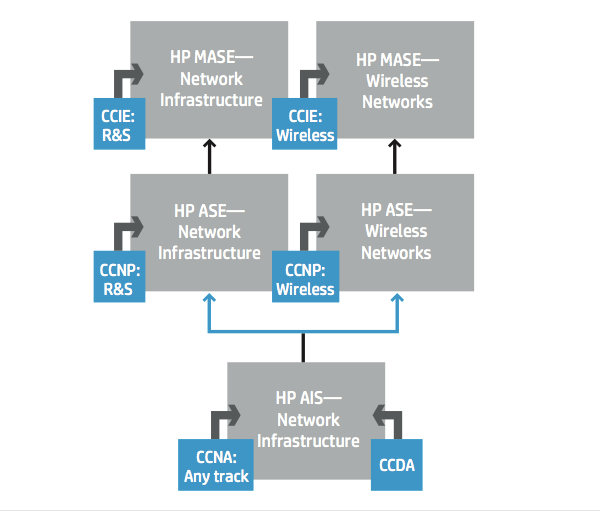HP Master ASE - Network Infrastructure
What is the “HP Master ASE - Network Infrastructure” certification?
HP has certification tracks covering most of its offerings - Servers, Storage, Software, Blades, Networking, etc. Within each track, there are up to three levels of certification - AIS, ASE and Master ASE. These roughly map to Cisco’s CCNA, CCNP and CCIE certification levels. There are three Networking-related tracks - Network Infrastructure, Network Architect, and Wireless Networks Implementer. These approximately map to Cisco’s Routing & Switching, Design, and Wireless tracks, respectively.
I’ve decided to pursue the “HP Master ASE - Network Infrastructure” certification. According to HP:
This certification validates that the technical professional is capable of designing, implementing and troubleshooting enterprise level network solutions, using established core and backbone Layer 2 and Layer 3 technologies such as MPLS and BGP4. This certification also validates that the technical professional can successfully migrate proprietary protocols to open-standard protocols using strategies that reduce risk and downtime.
Who is it for?
The main target is engineers who work on combined HP/Cisco networks, and have at least 5 years experience. The Master ASE level is aimed at around CCIE level, although with no lab requirement (see below), it will always be considered below CCIE/JNCIE.
You could maybe argue that the main focus at this stage is HP employees and partners, not direct customers. I don’t (yet) see job ads that require HPN certification, nor am I aware of any partner requirements for minimum numbers of certified employees. If HP could get to more like 33% market share, then perhaps we would see a shift towards companies specifically requiring HP certifications.
One of the things they are strong on is interoperability, not just being able to configure & troubleshoot HP equipment. I’m sure they’d like to be able to focus on HP, but they’re realistic about modern networks. Most people implementing HPN equipment will either have a Cisco background, or they will be migrating their current network from Cisco to HP. This certification will suit them.
How do I get it?
HP has tiers of certifications. The lowest level is “AIS - Accredited Integration Specialist.” The mid-tier is “ASE - Accredited Systems Engineer.” The top level is the “Master ASE - Master Accredited Systems Engineer.” Each level has specific exams that must be passed, before being able to move on to the next level. All exams are the typical multi-choice proctor-run exams, held at Pearson Vue centers worldwide. There are no lab exams.
But if you already hold Cisco certifications, you may be eligible to go through the “Fast Track” program. See this flow diagram:
Fast track pathways to HP Certification source
Since I already hold the CCIE R&S certification, I don’t need to go through the lower levels. I can go direct to the highest level. It’s also a slightly different set of exams I have to pass. HP’s philosophy is “You’ve already proven you know these technologies - we only need to test you on the specifics of using the technologies on HP equipment.”
I need to pass these two exams:
- HP0-Y32: Designing and Troubleshooting Open Standard Networks
- HP0-Y37: Migrating and Troubleshooting Enterprise Networks
Both of these exams are multi-choice exams, around 2-3 hours long.
I also need to submit proof that I have passed CCIE R&S.
Why am I doing it?
I don’t do hands-on network configuration these days. But as I work more with network configuration management tools (rather than just network monitoring tools), I need to be able to keep up with element configuration across a variety of vendors and platforms. Several of my customers are in the process of migrating from Cisco to HP network platforms, and I expect this to continue. The price differential in both up-front and support costs for HP vs Cisco is too great to ignore.
Plus I’ve got all this time on my hands now, post-CCIE. I’m ready for some more study, and a different challenge. The fact that HP gives me credit for my CCIE study is the icing on the cake.
As I work through the exams over the next couple of months I’ll post more specific details, along with a review of the exams. Hopefully I’ll be able to pass both of these exams within the next three months.
Resources
I have not found any blogs out there covering achieving this certification. Hopefully my series of posts will go some way to improving the situation.
I have also not been able to find anyone offering rack rental for HP equipment, or any legitimate simulators. There are rumours of a Comware simulator, but there is nothing official. There’s not a huge amount of current second-hand HP equipment available either - luckily the price of new kit is not too high.
The only study guides available are official HP press titles. Good thing there’s a few familiar authors there - some of them are written by Richard Deal, who wrote the CCNA book I used way back in 2004.
